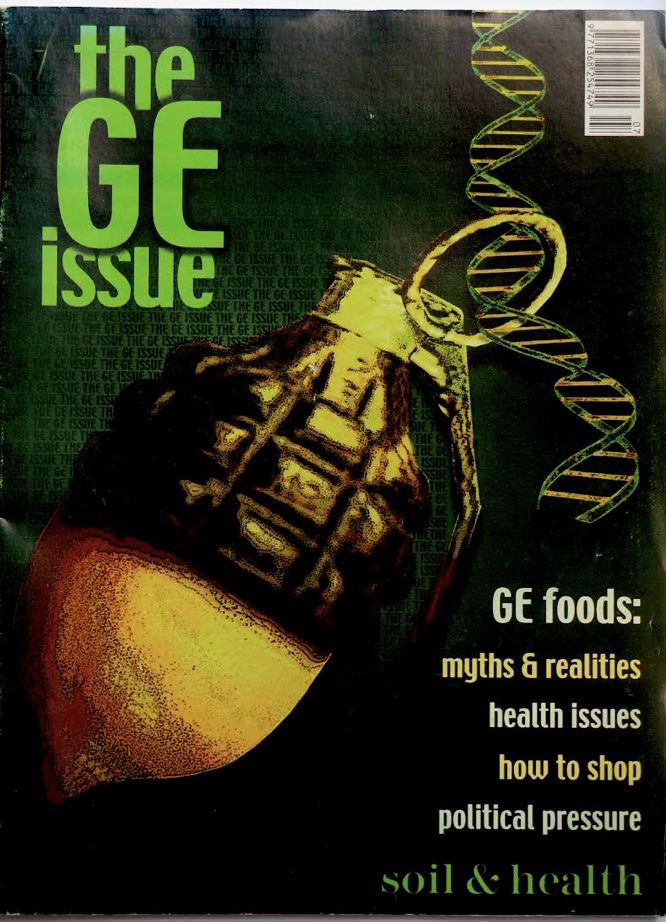
There have been calls to restart the conversation about Genetic Engineering with the public.
It’s a shame then, that the National Party’s policy to unleash Biotechnology begins the conversation by refusing to do what people want, which is to test and label gene edited food.
Wherever you sit in the GE debate, most people support the consumer’s right to choose.
Denying this right by exempting gene editing foods from regulation and labelling sets the National Party policy on a collision course with consumers at home and abroad.
In a world where the customer is king or queen, consumer choice, disclosure of ingredients on packaging and traceability have come to sit at the heart of the proposition.
Traceability is crucial to New Zealand’s primary industry and has allowed for effective action on contamination incidents in infant formula and disease outbreaks.
The public attitude to labelling of gene edited food is reflected in recent surveys of UK adults who are also facing the prospect of government exempting new products of gene editing from regulation. Part of the distrust of unlabelled gene edited food is that CRISPR-cas9 was only invented in 2012. That’s not so long in terms of the evolutionary history that gene editing is designed to override.
In post-Brexit England the terms New Breeding Techniques (NBT) and Precision Breeding have become euphemisms for gene editing, but the mood of the consumer is clear.
Surveys by the Food Safety Authority and a YouGov poll in November 2022 found that:
*79% of adults in the UK think that precision bred crops, animals and foods should be clearly labelled on the food package
* 83% think precision bred organisms should undergo safety testing before being put on sale
* 80% think they should undergo environmental safety testing
* 79% think they should be traceable through the farming and food system.
Aware of the risk of losing consumer and farmer trust in the new technology Corteva Agriscience, the world’s second largest seed company, has committed to label all seeds developed using gene editing or “new genomic techniques” (NGTs).
A report in Politico (Politico (Morning Agri). Corteva to label NGT seeds. 5 May 2023) says Corteva “are committed to voluntarily disclosing the breeding methods…Farmers will know what they’re buying and what they’re putting in the soil for cultivation.”
New technologies are also being developed to detect gene edited products and maintain integrity in the food system.
The EU’s Horizon research for their Farm2Fork strategy is finding new detection methods for products derived from new genomic techniques. It is funded by The Research Council of Norway and The German Federal Agency for Nature Conservation with partners in Austria, France, Germany, Lebanon and Brazil.
One of the strategy´s main priorities is “to ensure traceability and authenticity, and to enhance transparency.”
So what do people do if the government wont label gene edited food?
Consumers look to the brands of manufacturers and supermarkets that they trust. Such is the mis-match between consumer expectations and government plans for labelling that supermarkets have been dragged into the argument. The Co-Op is the first of the UK supermarkets to commit to voluntary labelling of Gene Edited food.
Supermarkets have been dragged into the fray before.
In the 2000’s, public demand for labelling of GE food resulted in mass protests in New Zealand. The supermarkets were caught in the middle of the debate and the public demand for labelling of GE ingredients on packaging.
Prime Minster Helen Clark was followed around by someone dressed as a can of Wattie’s corn demanding the consumer right to choose and protection of GE-food production. A pregnant woman and man in a wheelchair were amongst three protesters arrested for going into supermarkets and sticking labels saying ‘may contain GE ingredients’ on a tomato sauce bottle and other products.
The advertising campaign for Pam’s which featured chef Jamie Oliver, was spoofed by protesters dressed as ‘Naked Chefs’ outside Pak’NSave. Some wag painted the sign for Foodtown (now Countdown) so its tagline read ‘For GE-food’.
Both supermarket chains listened to their customers and today Pams, Countdown, Macro, and Odd Bunch all maintain a GM-free policy.
Most of the big brands manufactured in New Zealand also exclude GE ingredients. Contrary to what is claimed, the ‘soy milk in your coffee’ in New Zealand is actually most likely to be GE-free, and in the better cafes, Fair Trade and organic too. Check the label on the products in your fridge.
Even the makers of the Impossible Burger stopped using GMO soy as their main ingredient when they launched the product here. They made the call to respond to kiwi consumer rejection of unsustainable GE soy and avoided having to disclose it. Today they use ‘Identity Preserved’ soy certified to be non-GMO and test every imported batch of the Impossible Burger for contamination.
Shoppers must not be left to ‘count on Countdown’ to label gene edited food voluntarily, as the UK Co-Op has promised to do.
The National Party must not deny consumer choice by exempting gene editing from labelling. The consumer expectation for disclosure of GE ingredients runs deep.
References:
https://gmwatch.org/en/106-news/latest-news/20194-uk-consumers-want-safety-testing-risk-assessment-and-labelling-of-precision-bred-gmos
Corteva to Label Gene Edited Seeds https://www.gmwatch.org/en/106-news/latest-news/20225-corteva-says-it-will-label-new-gm-seeds
https://abiggerconversation.org/wp-content/uploads/2023/06/Sarah-Z-Agapito_Gene-Editing-Regulation_Acknowledging-Uncertainty_-Webinar-Presentation-130623.pdf
Impossible Burger /MPI documents https://www.gefree.org.nz/official-information-act-requests/




Jon – I have mixed feelings over GE crops…on the one hand, they allow for more harvests, but on the other hand, the behaviour of certain Corporations who engineer those crops towards farmers stinks!
I agree
If we take baby steps we should be right. Start with internal only. Second – use feeding stock the main trial for the business practice & governance.
Go ahead, label it. I’ll preference GE as much as I avoid “organic”.
At least GE is real, and beneficial to people and the environment. “organic” thrives in bullshit, chemicals worse than science can make, has lower yields and higher water/nutrient requirements.. in short “organic” is detrimental to the environment.
Anyone using “organic” practices should have their product strictly labelled. And an excise tax.
I am with you.
GM corn has been produced for about 30 years in the USA and the only side effects have been:
> An vast increase in food production. So large in fact that the US would have needed to plough up a quarter of its national parks if it were to produce that much without GM crops.
> A net reduction in the use of herbicides
So it must be bad LOL
And the most corpulent population on the planet. Forget about “fat” being the main cause of obesity, its that corn. That might not be because it’s GM but can we not go down that path of corn derivatives being everywhere? May be it’s too late
Because they have a surfeit of food? LOL
No. Americans complain about the high fructose corn sweetener which is in everything and comment that if they go to live in Europe they can lose kilos as well as eat more.
It depends on the cycle. You’ve got herbicide proof cropes that are basically gene edited to be dryer and cope with dryer environments but if it rains during the harvest period then you have to spray it with this anti mold stuff. I forget what it’s called it’s called but basically studies showed that 10% of rates exposed to these chemicals turned female and started producing eggs. Lol. So yeah. Testing. And. Labels.
I hope consumers prefer labeling of such products….I really hope this proves to be the case
The flaw in all arguments against GM is that the modified food might somehow affect our DNA. We’ve ALL been eating the DNA in meat, vegetables and fruit. How many of us have any resulting genetic change? NONE! DNA is digested and its components either recycled or broken down for energy. The only fault I can see with GE food is a reduction in genetic variation. Particularly so if relatively few individual plants of each species are genetically modified and then cloned.
What..? What the fuck?
GE crops..! I see feedlot robots injecting plants and animals with Brawndo. Makes plants grow dumbasses. https://www.imdb.com/title/tt0387808/
Cows do literally scream, you do know that right? When the needle goes in…
There’s one thing we must always remain mindful of.
The city slickers and their bankster besties who have our farmers buried under debt and insecurity to ensure their on-going subservience thus remain ripe for the exploiting are coming unstuck mainly thanks to me but also to that there internettery thing-a ma jiggery.
Our farmers have been boldly exploited and deliberately subjugated since refrigerated shipping and triple wool bale dumping. A short steamy boat ride then 2000% profit for never having to lift a wee soft pinky.
All the shit above about Gee Eeeee is puffery to hide crimes. And fortunes, aye Boys? Those big ol freezing works in Southland, them huge wool stores in Invercargill with Wrightson’s written all over them but they have nothing to do with farming. They simply store to launder all but free farmer produce. Farmers are down on the farm either contemplating suicide or have sold and moved to Wellington to become one of you. The enemy.
Farmers. Strike. You have powers mightier than the laptop. Wield them. Strike. And for Gods sake. See the merit in joining with Maori. The best kept secret is they are your greatest ally and you theirs.
It’s not all about an emotional response. People listening to my approach to gene editing will not be persuasive to you but there are ways of demonstrating how societies can be organised around industrial characters that produces better outcomes for humans.
So maybe if I wrap up and maybe you wrap up with a closing argument consistent with the view that niether of is are inconsistent in our views of gene editing. I don’t think there are any straw men because I can be considerate of your views on gene editing if likewise you do the same even if your view is a clear no to gene editing because I am human first.
if farmers are as concerned about ‘farming’ as they claim….they should be against this as currently our produce is at premium if we go down the ge road that markup disappears
That kind of predatory science denying capitalism is why we can’t have nice things.
The Federated Farmers group while not representing many or all farmers and dairy do seem to have been sadly captured by the the last three pro GE leadership from William Rolleston to Andrew Hoggard so from the Life Science network , to the Act party now
Agreed. There is no market in the world that prefers GE crops, and many markets that actively dislike them. GE crops are usually at the bottom end of the value chain. Introducing GE into NZ farming drops our production down to the lowest value commodity price range. Dumb dumb dumb.
Well this second version of genetic engineering , gene editing , is as controversial for a precautionary principle and so should all be labelled if a food , perhaps medicine too, we have protected our own pastures , our agriculture and organic food standards in being GE free in food and environment.Not to mention tourism.The agri-business lobby still test some of the hype, like the long GE rye grass experiments, which we have alternatives for that are basic and cheaper. .There is not contained GE lab ban and certainly they have some govt public funding .Importantly about risk if there is no insurance cover for the potential problems like the animal that had to be slaughters at Ruakura, then we could listen to those risk assessor’s as well rather than only in house companies. We need to reinstate the Bioethics Council associated with the RCGM , John Key seems to have scrapped this after only a year in office? Yet put forward a chief science minister who was essentially GP. Most consumers are ok with ‘do no harm’ medical uses because there’s is generally still ethical or better testing .
Will then you would be guaranteing that no further humans would be harmed if we didn’t do gene editing. I could come at this from either way because underpinning my theories is the idea of funding NZDF at 5% GDP forces the issue either way. We could feed 40 to 80 million people or round up climate refugees into holding pens I’m easy either way.
It seems to me that most of you need to do a bit of research before mouthing off here about the virtues of GE.
https://agreenerworld.org/genetically-modified/genetic-engineerings-five-epic-fails/
https://agreenerworld.org/a-greener-world/transparency-on-gmo/
https://www.irishtimes.com/opinion/letters/failures-in-genetic-engineering-1.139384
There’s nothing wrong with GE
GE has a history of huge hype, vast promises, but no substance. The few products that actually are agronomically successful such as roundup-ready crops (bred to be coated in glyphosate constantly during their production cycle and incidentally retaining the residue for consumers to eat) and ringspot virus resistant papaya have made huge profits for biotech companies, but not for farmer or for consumers (who often don’t want to eat them). Most GE crops are marketed internationally only because trade laws prevent receiving countries from rejecting them. They are commercial failures. Bringing them into NZ would be a serious mistake that would reduce our food production to the lowest commodity value levels.
For anyone thinking this stuff will save NZs economy and environment, think of it like this. If the value of our food exports halve, then farmers need to produce twice as much to make the same income. You think farm emissions and pollution are bad now? Think wha tit will be like when everyone is producing twice as much to avoid going broke.
GE is all marketing hype, and a high tech solution looking for a problem to solve. For example, instead of using GE ryegrass we can add plantain and cocksfoot into our pastures to get the same drought and emission benefits without any GE risk.
It is one thing to give GE medicine on people who are about to die and will not be reproducing, but once this stuff is in the environment it is there forever. This is a one way deal, it can never be undone. Personally I believe it should only be considered when we have 100% public support, because it impacts this country and all future generations forever.
Comments are closed.